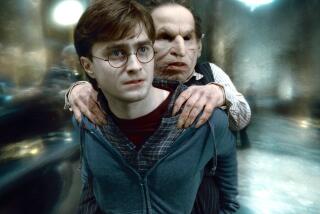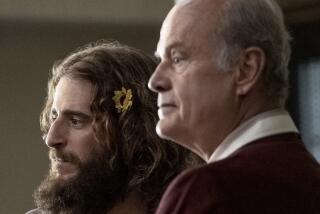From the archives:: ‘Harry Potter’ Casts a Spell Across the Ages

To mark the 20th anniversary of the first book’s release, Rowling took to her Twitter account to write, “20 years ago today a world that I had lived in alone was suddenly open to others. It’s been wonderful. Thank you.” (June 26, 2017) (Sign up for
- Share via
This article was originally published in September 1999 after the release of “Harry Potter and the Prisoner of Azkaban.” Author J.K. Rowling is today (June 26, 2017) celebrating the 20th anniversary of the launch of the Harry Potter series.
Read more about the 20th anniversary of the Harry Potter series »
I happened to be sitting in an English hospital the other day with my nose in “Harry Potter and the Chamber of Secrets” when an officious nurse spotted the children’s paperback in my hand and marched up to me.
“You could at least read the adult edition,” she barked.
“I think that’s hypocritical,” I sputtered.
The nurse, whose children apparently had long since grown into adulthood, melted, a warm smile spreading across her broad face.
“Oh, me too,” she said. “I’ve read all three Harry Potter books.”
It doesn’t take a child or even the slightest bit of magic, for that matter, to figure out why the Harry Potter books are such a hit with young and old alike: The orphaned wizard is absolutely divine.
Author J.K. Rowling’s third spellbinding book, “Harry Potter and the Prisoner of Azkaban,” goes on sale in the United States today after a long wait for fans who haven’t already rushed to buy it on the Internet. Or who weren’t lucky enough to have friends send them copies from Britain, where it went on sale at exactly 3:45 one afternoon early this summer--a time selected to avoid school truancies--and sold more than 60,000 copies in the first three days.
That was more than the hungrily awaited “Hannibal,” Thomas Harris’ sequel to “The Silence of the Lambs,” and more than any children’s book in the memory of British publishing.
In fact, Harry Potter is a worldwide bestseller, having been published in 27 languages and made it onto the New York Times list with two books at once. It hit No. 1 on the Amazon.com list nearly two months before it appeared in stores across the United States, with the other two Harry Potter books on its heels. The aggressive Internet sales forced up the U.S. publication date by more than a month.
The Harry Potter books would be on the Times of London’s list too if the snooty newspaper didn’t insist that only adult books qualify.
All told, the three books have sold about 7.5 million copies worldwide since the first one appeared in 1997.
“That is as of 5 p.m. today,” said Rowling’s agent, Christopher Little. “If you ask me next week, it will be close to 8 million.”
The first two books, “Harry Potter and the Sorcerer’s Stone” and “Chamber of Secrets,” have been printed in more serious-looking--dull--adult editions in Britain to reach childless readers and adults who might fold under the disapproving eye of nurses and other strangers.
“We put out the adult editions after we got a lot of fan mail saying that the books had been pinched by parents after bedtime reading,” said Rosamund de la Hey, head of children’s sales at the British publishing house Bloomsbury.
“There was also a huge section of the population that would not come across the book in the children’s section, the 25- to 35-year-old gap. And then there were the people we heard about reading the book on the train in the morning hidden behind the Financial Times” newspaper, De la Hey said.
Cowards.
It is children, however, who truly relish the books marketed for 9- to 11-year-olds. Kids read them over and over, memorizing pages and acting out parts.
“Children recognize the characters and can empathize with them. They have flesh and blood and are believable,” De la Hey said. “And it is a school environment in which there are no parents around, so they are full of adventures.”
A Sorcerer Apprentice
For those who have not been fortunate enough to read the books--aloud to children or clandestinely in the subway--Harry Potter is a teenage wizard who is both underdog and hero. He was orphaned as a 1-year-old by Voldemort--a force so evil most only dare call him You-Know-Who--who killed his parents and left Harry with a lightning-bolt-shaped scar on his forehead.
He is scrawny, with rumpled dark hair, and was raised by a mean, nonmagical aunt and uncle who never told him about his special background. Instead, they house him in a cupboard under the staircase and give him such holiday gifts as a coat hanger, toothpick and an old sock of Uncle Vernon’s while his fat, blond cousin Dudley gets 37 presents for his birthday.
On Harry’s 11th birthday, wizards seek him out to lead him to his destiny--British boarding school. But not just any boarding school. This is Hogwarts School of Witchcraft and Wizardry, founded in AD 1000, with the school motto Draco Dormiens Nunquam Titillandus (Never Tickle a Sleeping Dragon).
The school uniform is a black robe and black hat for daily wear, with name tags, please. Supplies include a caldron and magic wand along with a hefty list of books for courses such as Potions, Transfiguration and Combat of the Dark Arts.
At school, Harry emerges as the hero. Not only is he the best wizard of his generation, able to fight You-Know-Who, but also the star of his Quidditch team--a sport a lot like soccer but played with four balls and in the air, on broomsticks.
A tidbit from the new book: Harry gets a new Firebolt broomstick, the best and fastest there is.
Also making an appearance in the new book are Dementors, frightening jail guards from Azkaban who destroy every happy memory one has ever had and can suck out a human soul with a kiss.
“They represent the coldness and deadness of clinical depression,” Rowling told the Telegraph Magazine this summer. “Anyone who has had it knows that feeling of emptiness. You can’t imagine not having it.”
Rowling did. The books have been a phenomenal success for the young wizard’s creator, whose rags-to-riches success is almost as magical as Harry Potter himself.
Old-Fashioned Storytelling
As an unemployed, divorced mother, Rowling wrote her first book in longhand over single cups of coffee in Edinburgh cafes notable for the fact that they were considerably warmer than her poorly heated apartment. She had about two hours at a stretch--the length of her baby daughter’s nap.
What she produced in those stolen hours, and at night, is good, old-fashioned storytelling in the British tradition of C.S. Lewis and Roald Dahl, absent the religion of Lewis and with a few more morals than Dahl. The result is a funny, quirky flight of fantasy, a battle between good and evil in which--so far--good prevails.
Harry Potter is a kind of modern Peter Pan, except that Harry is growing up. He ages a year in each book--he’s 13 in “Prisoner of Azkaban”--and the series will end after seven books, the length of time it takes to graduate from Hogwarts. According to agent Little, Rowling has them all mapped out, including a final chapter.
Rowling told the Telegraph Magazine that she doesn’t believe in witchcraft, in “any of this, astrology, alchemy, goblins, trolls, elves, mandrakes, phoenixes, dragons, basilisks--but it is a picturesque world. There’s poetry to it, and I have always found it fun.”
And she has spun gold out of words. In addition to lucrative book sales, the film rights to the first two books have been sold to Warner Bros. for a reputed seven-figure sum. At 33, Rowling has moved into a three-bedroom house with her 5-year-old daughter, where she has to sequester herself from the attention of the world’s media and fans.
Her life is getting brighter as she plows ahead with the fourth Harry Potter tome, but the books are getting darker. You-Know-Who is stronger. Harry discovers his hormones in book four, and a death reportedly will take place there.
“It is only by killing someone the reader cares about that you will have a sense of how evil it is to extinguish human life,” Rowling told the Telegraph Magazine.
Children and parents need not worry now. “The Prisoner of Azkaban” is as delightful and uplifting as the first two books. As for the others, we’ll all have to wait together.
Meanwhile, says De la Hey of Bloomsbury, an unexpected offshoot of Harry Potter’s popularity is this: “Apparently, applications from American children to British boarding schools have gone up.”
Remember, kids: It may be magical, but it’s still fiction!
ALSO
20 years after J.K. Rowling’s first Harry Potter book, students reflect on how it shaped their lives
J.K. Rowling, Twitter celebrate 20th anniversary of ‘Harry Potter’ debut
Muggles and wizards unite: J.K. Rowling’s Pottermore has an official Harry Potter book club
More to Read
Sign up for Essential California
The most important California stories and recommendations in your inbox every morning.
You may occasionally receive promotional content from the Los Angeles Times.









